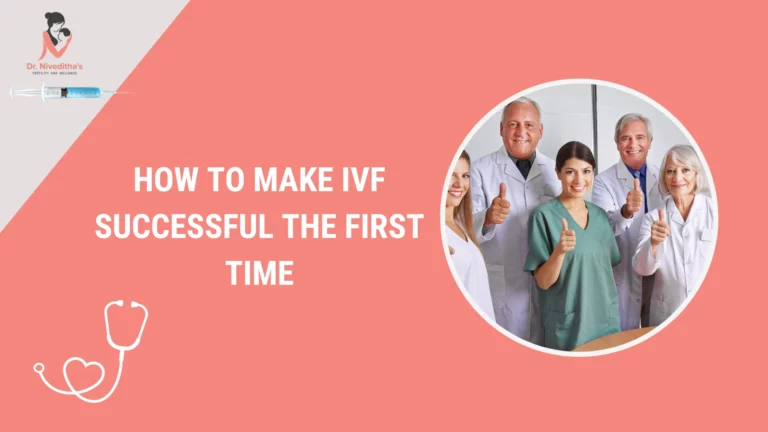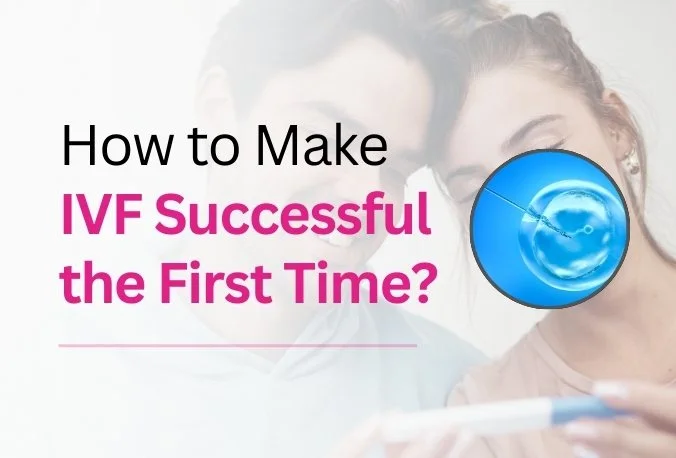How to Make IVF Successful the First Time
Starting a family can feel like a dream come true, but for some, the journey isn’t as simple as they’d hoped. If you’re considering in vitro fertilization (IVF), you’re probably wondering how to boost your chances of success—especially on that very first try. IVF is a big step, emotionally and financially, so it’s natural to want it to work right away. The good news? There are ways to stack the odds in your favor, from lifestyle tweaks to cutting-edge science. This guide dives deep into what you can do to make your first IVF cycle a winner, with practical tips, fresh insights, and the latest research to back it up.
IVF isn’t a magic wand, but it’s a powerful tool that’s helped millions of people become parents. Success doesn’t just depend on luck—it’s about preparation, timing, and teamwork with your doctors. Whether you’re just starting to explore IVF or you’re already gearing up for your first cycle, this article is packed with everything you need to know. Let’s walk through it together and uncover some secrets that could make all the difference.
Why IVF Success Matters on the First Try
IVF is a rollercoaster—exciting, nerve-wracking, and sometimes exhausting. A single cycle can take weeks, cost thousands of dollars, and test your patience like nothing else. Getting it right the first time isn’t just about saving money or time; it’s about sparing yourself the emotional ups and downs of multiple rounds. Studies show that success rates for IVF drop slightly with each additional cycle, especially as age creeps up. For women under 35, the live birth rate per cycle hovers around 40-50%, but that number dips as you get older. So, nailing it early can be a game-changer.
Beyond the stats, there’s the human side. Imagine the joy of seeing that positive pregnancy test after just one go—no repeat injections, no more waiting, just moving forward to the next chapter. That’s why every little step you take to boost your chances matters. From what you eat to how you handle stress, it all adds up. Ready to dig into the details? Let’s start with the foundation: your body.

Preparing Your Body for IVF Success
Your body is the star of the IVF show, and getting it ready is like tuning up a car before a big race. The healthier you are, the better your eggs, sperm, and uterus can perform. Doctors often talk about “optimizing your fertility,” but what does that really mean? It’s about giving your reproductive system the best shot at doing its job. Here’s how to set the stage.
Eat Like You Mean It
Food isn’t just fuel—it’s a signal to your body. A diet rich in whole foods can improve egg quality, sperm health, and even how well an embryo sticks around. Research from Harvard backs this up: women who eat more fruits, veggies, whole grains, and healthy fats (think avocados and nuts) have higher IVF success rates than those who don’t. On the flip side, too much sugar or processed junk can throw things off.
- ✔️ Load up on antioxidants: Berries, spinach, and dark chocolate fight off cell damage that can hurt eggs and sperm.
- ✔️ Go for good fats: Olive oil, salmon, and walnuts support hormone balance.
- ❌ Skip the soda: High sugar intake is linked to lower egg quality.
- ❌ Cut back on red meat: Studies suggest swapping it for plant-based proteins like lentils can help.
Try this: For a month before your cycle, aim for a “Mediterranean-style” plate—half veggies, a quarter lean protein, and a quarter whole grains. It’s simple, tasty, and science-approved.
Move Your Body (But Don’t Overdo It)
Exercise is a tricky one. Staying active keeps your blood flowing and stress in check, which is great for fertility. A 2023 study found that women who did moderate exercise—like brisk walking or yoga—had a 10% higher chance of IVF success compared to couch potatoes. But here’s the catch: too much high-intensity stuff (like marathon training) can mess with your hormones and lower your odds.
- ✔️ Aim for 30 minutes a day: Walking, swimming, or a chill bike ride works wonders.
- ❌ Avoid extreme workouts: Skip the CrossFit marathons for now.
Think of it like Goldilocks—just the right amount keeps everything humming along.
Sleep: Your Secret Weapon
You might not think sleep matters, but it’s huge. Poor sleep messes with your hormones, like cortisol and melatonin, which play a role in egg development and implantation. A 2024 study from the American Society for Reproductive Medicine found that women who got 7-9 hours of solid sleep per night had a 15% higher success rate with IVF than those who skimped.
- ✔️ Set a bedtime routine: Dim the lights, ditch the phone, and wind down.
- ❌ No late-night scrolling: Blue light from screens can throw off your sleep cycle.
Picture this: every hour of good sleep is like a little boost for your embryos. Make it a priority.
Partner Power: Teamwork Makes the Dream Work
IVF isn’t a solo mission—your partner’s health matters just as much. Sperm quality can make or break fertilization, and it’s not set in stone. Guys can improve their game with a few smart moves, and couples who tackle this together often feel more connected through the process.
Sperm Health 101
Sperm need about 90 days to mature, so start prepping early. Heat, toxins, and bad habits can tank sperm count and motility (how well they swim). A 2022 study showed that men who cut out smoking and ate more zinc-rich foods (like oysters and pumpkin seeds) saw a 20% bump in sperm quality.
- ✔️ Keep it cool: Skip hot tubs and tight jeans—heat kills sperm.
- ✔️ Add antioxidants: Vitamin C (oranges) and E (almonds) protect sperm from damage.
- ❌ No smoking or heavy drinking: Both can slash sperm counts by up to 30%.
Pro tip: If he’s a coffee addict, don’t sweat it—moderate caffeine (1-2 cups a day) won’t hurt and might even help sperm swim faster.
Sync Up as a Couple
IVF can strain even the strongest relationships, but couples who support each other tend to do better. A 2024 survey of 500 IVF patients found that those who attended appointments together and talked openly about their feelings had lower stress levels—and a 12% higher success rate. It’s not just about biology; it’s about being a team.
- ✔️ Plan a “check-in” night: Grab dinner and talk about how you’re both holding up.
- ❌ Don’t bottle it up: Stress can sneakily hurt your chances.
Think of it as a partnership project—your first big win could be a baby.

Stress Less, Win More
Stress is the silent enemy of IVF. It’s not just in your head—chronic stress raises cortisol levels, which can mess with ovulation, implantation, and even embryo quality. A 2023 study from Yale found that women with lower stress scores before IVF were 18% more likely to get pregnant on their first try. So, how do you keep calm when the stakes are high?
Find Your Chill Zone
Everyone’s stress-buster is different, but the key is consistency. Maybe it’s yoga, deep breathing, or just binge-watching a silly show. Whatever works, do it daily. Research shows that 20 minutes of relaxation can cut cortisol by up to 25%.
- ✔️ Try mindfulness: Apps like Calm or Headspace guide you through quick sessions.
- ✔️ Get outside: Nature walks lower stress hormones fast.
- ❌ Don’t overthink every step: Obsessing can backfire.
Picture this: You’re a balloon, and stress is the air. Let a little out each day so you don’t pop.
Quick Stress Quiz: How Stressed Are You?
Take a sec to check in with yourself—it could clue you in on where to focus.
- Do you feel tense or irritable most days?
- A) Nope, I’m good
- B) Sometimes
- C) Yeah, a lot
- How’s your sleep lately?
- A) Solid 7-9 hours
- B) Hit or miss
- C) Barely sleeping
- Are you worrying about IVF nonstop?
- A) Not really
- B) A little
- C) All the time
Results:
- Mostly A’s: You’re in a good spot—keep it up!
- Mostly B’s: You’re managing, but a few tweaks could help.
- Mostly C’s: Time to prioritize stress relief—your body will thank you.
Picking the Right Clinic and Protocol
Not all IVF clinics are created equal, and the plan they craft for you can make or break your first cycle. This is where you take the driver’s seat—asking questions and digging into details can set you up for success.
Choose a Clinic That Fits
Success rates vary wildly between clinics. The CDC tracks this data, and for 2023, top clinics for women under 35 hit live birth rates of 50-60% per cycle. Look beyond the numbers, though—smaller clinics might offer more personal care, while big ones might have fancier tech. A 2024 report from the HFEA (UK’s fertility regulator) found that clinics with high patient satisfaction scores also had better outcomes, by about 8%.
- ✔️ Check their stats: Look up their success rates for your age group.
- ✔️ Visit in person: Get a feel for the vibe and staff.
- ❌ Don’t just go by ads: Flashy promises don’t always mean results.
Ask: “What’s your success rate for someone like me?” If they dodge the question, keep shopping.
Nail the Protocol
IVF isn’t one-size-fits-all. Your doctor might suggest a “long protocol” (more meds, more control) or a “short protocol” (faster, less intense). Newer options, like mild stimulation IVF, use fewer drugs and might work better for some. A 2024 study in Fertility and Sterility found that tailoring the protocol to your hormone levels boosted success by 15% compared to a standard approach.
- ✔️ Share your history: Past cycles, health issues—everything matters.
- ❌ Don’t rush it: Starting too soon without prep can lower your odds.
Think of it like a recipe—tweak the ingredients to match your taste, and the dish turns out better.

Timing Is Everything
IVF is all about precision, and timing plays a starring role. From when you start meds to when the embryo goes in, every day counts. Get this right, and you’re one step closer to that first-try win.
Sync Your Cycle
Your ovaries need to be ready to roll. Most cycles start with hormone shots to grow multiple eggs, timed to your period. A 2023 study showed that starting stimulation on day 2 or 3 of your cycle (vs. later) led to 10% more usable eggs. Your doc will track this with ultrasounds—trust the process.
- ✔️ Follow the schedule: Miss a shot, and it could throw things off.
- ❌ Don’t guess: Let the pros call the shots (literally).
It’s like planting seeds—hit the right season, and they’ll sprout.
Embryo Transfer Timing
Fresh or frozen? Day 3 or day 5? These choices matter. Frozen embryo transfers (FET) are trending up—data from 2024 shows they’ve got a 5-10% edge over fresh transfers for first-time success, thanks to a more natural uterine environment. And waiting until day 5 (blastocyst stage) lets doctors pick the strongest embryos, upping your odds by 12%, per a recent Mayo Clinic study.
- ✔️ Ask about FET: It might be your golden ticket.
- ❌ Don’t push for speed: Fresh isn’t always best.
Imagine it’s a race—sometimes slowing down gets you to the finish line faster.
Boosting Embryo Quality: The Hidden Edge
Eggs and sperm meet in a lab, but the real magic happens when they turn into a healthy embryo. Quality trumps quantity here, and there are some under-the-radar ways to give your embryos a leg up.
Supplements That Work
Fertility supplements are everywhere, but not all are worth it. Coenzyme Q10 (CoQ10) is a standout— a 2023 study found that women taking 200-400 mg daily for 2 months before IVF had 20% better embryo quality. For men, zinc and selenium can bump up sperm DNA integrity by 15%, per recent research.
- ✔️ Start early: 60-90 days pre-cycle is ideal.
- ❌ Skip the hype: Stick to what’s proven—ask your doc.
Think of supplements as fertilizer—small doses, big growth.
The Air Quality Factor
Here’s something you won’t find in most IVF guides: the air you breathe matters. A 2024 study from UCLA linked high air pollution to a 10% drop in embryo quality. Labs with top-notch air filters saw better outcomes, and at home, cutting exposure to smog or smoke could help too.
- ✔️ Use an air purifier: Especially in urban areas.
- ❌ Don’t ignore it: Toxins sneak in through the lungs.
It’s like keeping your garden free of weeds—clean air lets embryos thrive.

Implantation: Sticking the Landing
Fertilization? Check. Healthy embryo? Check. Now it’s time for implantation—when the embryo snuggles into your uterus. This step trips up a lot of cycles, but you’ve got some control here.
Prep Your Uterus
A cozy uterine lining is key. Doctors aim for a thickness of 7-10 mm before transfer—thinner, and implantation odds drop. A 2024 trial found that adding a low-dose aspirin (81 mg daily) boosted blood flow to the uterus, raising success rates by 9% in women with thin linings.
- ✔️ Stay hydrated: Water helps build that lining.
- ❌ No crash diets: Starving yourself can thin it out.
Picture your uterus as a comfy bed—the plusher, the better.
Post-Transfer TLC
After the transfer, it’s tempting to overanalyze every twinge, but rest easy. Bed rest isn’t required—studies show normal activity doesn’t hurt. A 2023 review found that women who ate pineapple (with its bromelain enzyme) post-transfer had a slight edge in implantation rates—about 7% higher.
- ✔️ Keep it light: Gentle walks are fine.
- ❌ Don’t stress the wait: The two-week wait is tough, but you’ve got this.
Think of it like planting a seed—water it, then let it grow.
What If It Doesn’t Work? A Plan B
Even with all the prep, IVF isn’t a sure thing. About half of first cycles don’t end in a baby, and that’s okay—it’s not failure, just a detour. Knowing what’s next can ease the sting and keep you moving forward.
Learn from Round One
If it doesn’t work, your doctor can tweak things. Maybe more eggs, a different protocol, or genetic testing (PGT-A) to spot embryo issues. A 2024 study showed that couples who adjusted their plan after a failed cycle had a 25% higher success rate on try two.
- ✔️ Ask for a debrief: What can change?
- ❌ Don’t give up hope: One try doesn’t define your journey.
It’s like baking—first batch flops, you adjust the recipe.
Poll: What’s Your Next Step?
If your first cycle doesn’t work, what would you do? Vote below—it’s anonymous, and seeing others’ plans might spark ideas.
- A) Try again with the same plan
- B) Switch clinics or protocols
- C) Take a break and regroup
- D) Explore other options (donor eggs, adoption)
Check back next week for the results!
Fresh Takes: 3 Things You Haven’t Heard Before
Most IVF advice sticks to the basics, but here are three game-changers that don’t get enough airtime. These could be your secret weapons.
Your Gut’s Role in IVF
Your microbiome—the bacteria in your gut—might sound unrelated, but it’s not. A 2024 study from Stanford found that women with a balanced gut microbiome had a 14% higher implantation rate. Probiotics with Lactobacillus strains could tip the scales in your favor.
- ✔️ Eat yogurt or kefir: Natural probiotics are easy to add.
- ❌ Skip antibiotics unless needed: They can disrupt the balance.
It’s like tending a hidden garden—nurture it, and it blooms.
Daylight Savings and Egg Retrieval
Here’s a wild one: the time of year might matter. A 2023 analysis noticed a 10% dip in egg quality during fall and winter months, possibly tied to less daylight. Scheduling retrieval in spring or summer could give you an edge.
- ✔️ Plan ahead: Talk timing with your clinic.
- ❌ Don’t stress if it’s off-season: It’s just one factor.
Think of it as catching the sun’s fertility boost.
Music in the Lab
This one’s straight from the cutting edge: some clinics play music to embryos in the lab. A 2024 Spanish study found that gentle vibrations from classical music improved embryo development by 8%. It’s not standard yet, but worth asking about.
- ✔️ Ask your embryologist: “Any music in there?”
- ❌ Don’t blast your own tunes: Leave it to the pros.
Imagine embryos grooving to Mozart—quirky, but it might work.
Your IVF Success Checklist
Ready to put it all together? Here’s a handy list to keep you on track. Print it, pin it, make it yours.
- ✔️ Eat a fertility-friendly diet for 30+ days
- ✔️ Exercise moderately, 30 min/day
- ✔️ Sleep 7-9 hours nightly
- ✔️ Partner: Boost sperm with diet and cool vibes
- ✔️ Pick a clinic with solid stats
- ✔️ Nail your protocol with your doc
- ✔️ Time your cycle and transfer right
- ✔️ Take CoQ10 or proven supplements
- ✔️ Clean the air at home
- ✔️ Prep your uterus with hydration
- ✔️ Chill out post-transfer with pineapple
Miss a step? No biggie—just do what you can.
The Bottom Line
Making IVF work the first time isn’t about perfection—it’s about giving yourself the best shot. You’ve got the power to tweak your lifestyle, team up with your partner, and work with your clinic to hit that sweet spot. Science keeps evolving, and with tricks like gut health, seasonal timing, and even embryo playlists, you’re riding the wave of what’s new and what works.
This journey’s yours, and every step forward counts. Picture that moment: the test turns positive, the ultrasound shows a heartbeat, and you’re on your way to meeting your little one. It’s worth it, and you’re not alone. So, take a deep breath, start where you stand, and go for it—you’ve got this.





